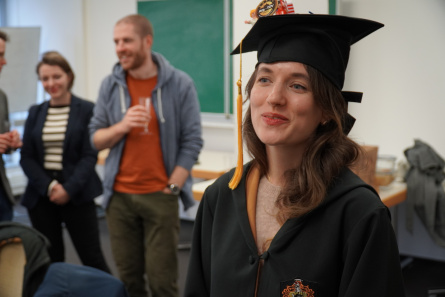
Being a member of both the former A01, now INF project and working in the field of Natural Language Processing (NLP), Gabriella obtained her PhD from the Faculty of Mathematics/Computer Science (FB 03) with a "summa cum laude". In her research, Gabriella looked at the possibilities to automatically assess argument quality and recommend improvements which may inform downstream applications like writing assistants.
On Wednesday, December 13, Gabriella Skitalinska successfully defended her PhD thesis titled "Learning to Improve Arguments: Automated Claim Quality Assessment and Optimization". In her thesis, she explores the following research question: What makes a good argument and how can we computationally model this knowledge to develop tools supporting individuals in improving their arguments? To do so, she suggests using human revisions of argumentative texts as a basis to understand and model quality characteristics of arguments. In her first paper (Skitalinskaya and Wachmsuth (2023)), she summarized the main challenges of performing argument quality assessments using revision-based corpora covering issues related to the representativeness and reliability of data, topical bias in revision behaviors, appropriate model complexities and architectures, and the need for context when judging argumentative text. As part of her second paper (Skitalinskaya et al. (2021)), she describes how revision histories of argumentative texts can be used to analyze and compare the quality of argumentative texts. Finally, as part of the third paper (Skitalinskaya et al. (2023)), she works towards not only being able to automatically assess but also to optimize argumentative text. Here, she presents an approach that generates multiple candidate optimizations of an argumentative text and then identifies the best one using quality-based reranking.
Beyond her research, Gabriella was actively involved in co-creating WeSIS right from the beginning of the CRC, and took responsibility for implementing many of the systems nowadays features. Together with further A01 members she organized the co-creation process which led to the first prototype successfully reviewed for the second funding phase. Later, she continued both her research and her work on WeSIS in the INF project before joining the working group on NLP of Henning Wachsmuth at the Institute of Artificial Intelligence, Leibniz University Hannover.
For more results of Gabriella’s research, access her publications here.
Contact: Gabriella Skitalinska (g.skitalinska@ai.uni-hannover.de)
Contact:
Prof. Dr. Andreas Breiter
CRC 1342: Global Dynamics of Social Policy
Mary-Somerville-Straße 7
28359 Bremen
E-Mail: abreiter@ifib.de













